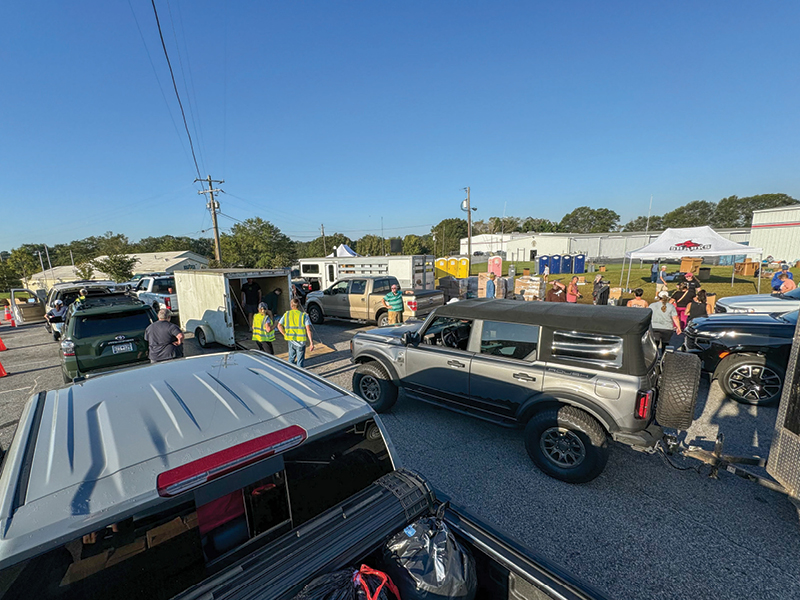United Pilot’s Grassroots Effort Aids Disaster Victims
By John Perkinson, Senior Staff Writer

F/O Seth Ebner (United), along with other pilots, helps transport necessities to residents in western North Carolina affected by Hurricane Helene.
In addition to providing career advancement and protections, unions often create a spirit of community, camaraderie, and even altruism among their members. F/O Seth Ebner (United), a Greenville, S.C., resident and recent survivor of Hurricane Helene, is a prime example.
The United Local Council 5 Grievance Committee vice chair shared that while his family experienced only a temporary loss of electricity and some general inconvenience related to the massive storm, he felt compelled to intervene when he realized that his neighbors to the north weren’t so fortunate. He specifically thought about the plight of his fellow ALPA pilots in the region.
Massive rain totals from the downgraded hurricane in the mountainous areas of western North Carolina had resulted in catastrophic flooding and countless landslides. Many of the affected communities were rendered unrecognizable, and subsequent emergency response efforts were hindered by impassable roads, downed bridges, and widespread power outages.
Talking with his local council pilot reps, Ebner knew that he and other ALPA members in the Greenville/Spartanburg area had access to trucks and trailers that they could use to transport necessities to the western North Carolina area. Ebner later spoke with Capt. Brian Noyes (United), his pilot group’s master executive council (MEC) vice chair, and Capt. Dave Bernard (United), the group’s Strategic Preparedness and Strike Committee chair, about how the pilots could provide aid to Helene victims. The challenge would be locating the individuals, determining what their immediate needs were, and soliciting the necessary time and donations from their pilot peers since this last-minute initiative had no funding.
Using ALPA’s Strategic Preparation and Communication System, a computer-based tool that enabled Ebner to determine where members were concentrated, he was able to get a list of every United pilot living within a 100-mile radius of Asheville, N.C. He distributed texts and e-mails to those in the targeted area. He also quickly created a website, giving affected members an opportunity to indicate whether they had specific needs or resources they could share with others.
In addition, Ebner rented a box truck on several occasions, filling it with necessities and driving it up to hard-hit communities like Hendersonville, N.C.
Two weeks after Hurricane Hilton devastated portions of the east coast, Hurricane Milton hit the gulf coast of Florida. The Category 3 storm made landfall in Sarasota County, bringing a 10-foot storm surge, more than 100 tornado warnings, and damaging winds, prompting Ebner to further extend his grassroots relief effort.
The United pilots’ October 9 MEC News e-mail newsletter addressing the recent disasters advised, “Unaffected nearby pilots are volunteering to coordinate relief efforts. A fellow pilot will reach out via phone, text, and e-mail to anyone needing immediate assistance.”
For both hurricanes, Ebner concentrated on United pilots but eventually reached out to other pilot groups in the area. He contacted F/O Connor Wilm (FedEx Express), his pilot group’s MEC vice chair, encouraging him to direct FedEx pilots in need to the pilot relief website. Ebner knew Wilm from their previous days of flying together for PSA Airlines.
Ebner’s efforts complemented ALPA’s ongoing Pilots for Pilots program, the Association’s tax-exempt emergency relief fund that offers financial aid to ALPA families to cover the immediate, extraordinary expenses that follow widespread, catastrophic events. To date, Pilots for Pilots has issued grants totaling nearly $230,000 for approximately 100 members impacted by Helene and/or Milton.
During his outreach efforts, Ebner spoke with a family in the Tampa, Fla., area that had a flooded apartment and needed other accommodations. Another member in Hendersonville was facing a long-term power outage and required a generator.
“Some of these individuals were able to address their own needs before we could respond to them, but this was a good test case for how bad things can get and how quickly they can happen,” he stated, noting that his local council has since talked about formalizing this program, possibly establishing it as part of an MEC committee.
“We learned a lot as a group,” Ebner acknowledged. “The number of pilots who eagerly responded and were more than happy to support their fellow members in need really opened our eyes to what’s possible.”

